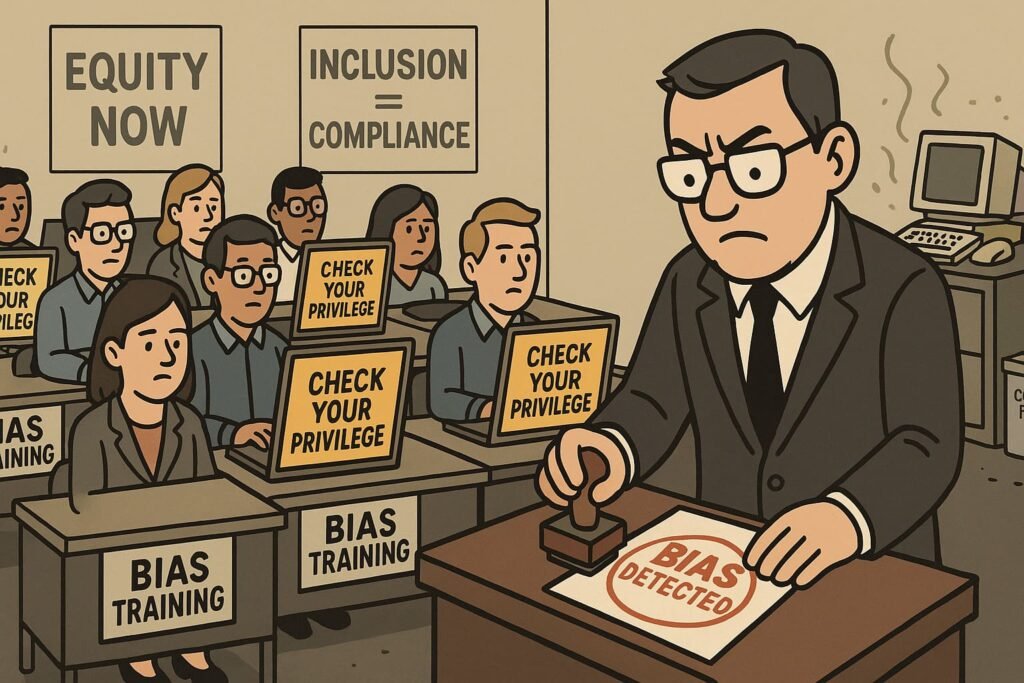Systemic Racism at Work – When Every Office Becomes a Training Room
From Bias to Bureaucracy
Once, workplaces focused on productivity, customer service, or simply making money. Today, many companies seem more focused on tackling systemic racism. The term — born in Critical Race Theory — has been imported wholesale into HR departments, where it now shapes training sessions, hiring practices, and even office conversations.
The result? Offices that look less like places of work and more like classrooms for perpetual guilt.
Table of contents
What Does Systemic Racism Mean in the Workplace?
In activist terms, systemic racism means racism is built into every institution. In the office, this translates into:
- Unconscious bias – You’re guilty even if you don’t notice it.
- Privilege – Some staff are said to have invisible advantages just for existing.
- Equity audits – Every outcome (hires, promotions, salaries) checked for disparities.
- Mandatory training – Because silence is complicity, everyone must “do the work.”
The premise: if differences exist between groups, the system must be racist. The fix? Endless programmes to root it out.
The Rise of Bias Training
The most visible effect of systemic racism in workplaces is the unconscious bias industry.
- Consultants earn thousands per session teaching staff to see hidden prejudice everywhere.
- HR departments make training mandatory, often with little evidence it changes behaviour.
- Employees sit through seminars where disagreeing with the material is itself branded as bias.
It’s less about solving racism and more about performing anti-racism.
Quotas and Equity Policies
Systemic racism thinking also drives quota systems.
- Hiring and promotion – Targets set by race or gender to “correct disparities.”
- Recruitment pipelines – Programmes that exclude some groups to boost others.
- Performance reviews – Managers judged not just on results but on “equity outcomes.”
Merit takes a back seat to representation. And while large corporations can absorb the costs, smaller businesses struggle to keep up.
Why Companies Embrace It
- PR cover: Announcing anti-racism pledges shields companies from criticism.
- Cheap virtue: Bias workshops are cheaper than raising wages or changing business models.
- Investor pressure: ESG (Environmental, Social, Governance) frameworks reward diversity metrics.
- Fear: Saying no risks reputational damage, boycotts, or activist outrage.
For corporations, systemic racism isn’t just a problem — it’s a branding opportunity.
The Consequences for Workers
- Silenced voices: Questioning the training can be treated as evidence of prejudice.
- Division: Staff sorted into “privileged” and “marginalised” groups.
- Resentment: Employees resent being treated as suspects instead of colleagues.
- Distraction: Time and money spent on workshops instead of real workplace improvements.
Ironically, a framework meant to bring harmony often leaves offices more tense than before.
Why It Matters
Systemic racism has moved from theory into daily office life, shaping policies and conversations across industries. It redefines the workplace from a space of productivity into a space of moral management — where employees are judged not just on their work, but on their compliance with ideology.
The real cost? Creativity, trust, and free thought.
Workplaces as Training Camps
The office used to be about work. Now, many feel like training camps for anti-racism ideology.
Systemic racism at work isn’t about solving prejudice. It’s about building a permanent industry of consultants, audits, and HR programmes — while employees foot the bill in wasted hours and rising costs.
FAQ: Systemic Racism at Work
What does systemic racism mean in the workplace?
It’s the idea that racism is built into office culture, hiring, and policies, requiring constant audits and training.
What is unconscious bias training?
Workshops claiming everyone harbours hidden prejudice, often mandatory for staff.
Why do companies adopt systemic racism policies?
For PR, ESG compliance, investor pressure, and fear of activist backlash.
What are the consequences for employees?
Division, resentment, silenced dissent, and wasted time in mandatory sessions.
Does systemic racism training work?
Evidence suggests little behavioural change — but it keeps consultants employed.



